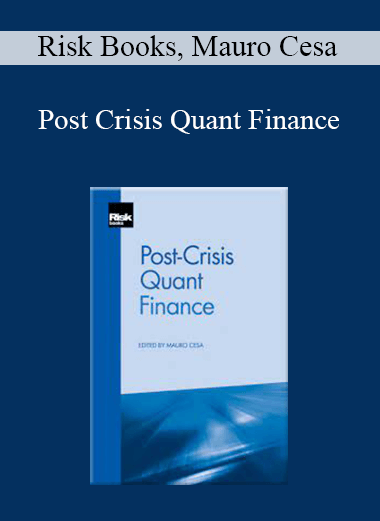Post-Crisis Quant Finance
“This timely book shows very clearly that well thought through modelling is not only useful but necessary in order to help financial markets to operate smoothly and perform their social role properly”
Alex Lipton, Bank of America Merrill Lynch and Imperial College
The financial crisis of 2007-8 shook the world of quantitative finance. First, it caused the industry as a whole to question long-held truisms which threw into doubt the pricing of even the most vanilla of derivatives. Second, the regulatory response dramatically reshaped the derivatives industry leading quants to shift their focus on capital, funding and of course risk.
The result has not been, as some doomsayers predicted, the end of quantitative finance or appreciation of its contribution to financial institutions and markets. Rather, quants have begun to rebuild. Aware now that frictions in markets under duress are the norm, not the exception, they are improving existing resilient models and developing new ones.
It is this new wave of developments that is the focus of Post-Crisis Quant Finance, edited and introduced by Risk magazine’s Technical Editor, Mauro Cesa. Post-Crisis Quant Finance brings together for the first time 20 peer-reviewed papers from the Cutting Edge series of Risk, internationally recognised among the quantitative community.
Contributors include Jesper Andreasen, Marco Avellaneda, Lorenzo Bergomi, Christoph Burgard, Jon Gregory, Julien Guyon, Brian Huge, Mats Kjaer, Richard Martin, Vladimir Piterbarg, Michael Pykhtin and Robin Stuart.
The book is divided into three sections.
I – Derivatives pricing, including
- equity derivatives;
- interest rates;
- derivatives;
- multiple-curve environments;
- collateralisation; and,
- pricing model calibration.
II – Asset and risk management, including
- liquidity risk;
- short selling;
- risk measurement tools; and,
- correlation structures,
III – Counterparty credit risk, including
- its bilateral formulation;
- connection with risk capital;
- stochastic representations;
- challenging computation; and,
- residual value of a deal at close-out.
As Alexander Lipton, writing in the foreword says: “The reader will benefit from the expertise of some of the sharpest thinkers in the field”.
This book outlines practically relevant solutions to the complexities faced by quants post-crisis. Each of the 20 chapters targets a specific technical issue including pricing, hedging and risk management of financial securities.
Post-Crisis Quant Finance is a must-read for quants, statisticians, researchers, risk managers, analysts and economists looking for the latest practical quantitative models designed by expert market practitioners.
Get download Risk Books, Mauro Cesa – Post Crisis Quant Finance at coursesblock.com right now!
Delivery Method
– After your purchase, you’ll see a View your orders link which goes to the Downloads page. Here, you can download all the files associated with your order.
– Downloads are available once your payment is confirmed, we’ll also send you a download notification email separate from any transaction notification emails you receive from coursesblock.com.
– Since it is a digital copy, our suggestion is to download and save it to your hard drive. In case the link is broken for any reason, please contact us and we will resend the new download link.
– If you cannot find the download link, please don’t worry about that. We will update and notify you as soon as possible at 8:00 AM – 8:00 PM (UTC 8).
Thank You For Shopping With Us!







